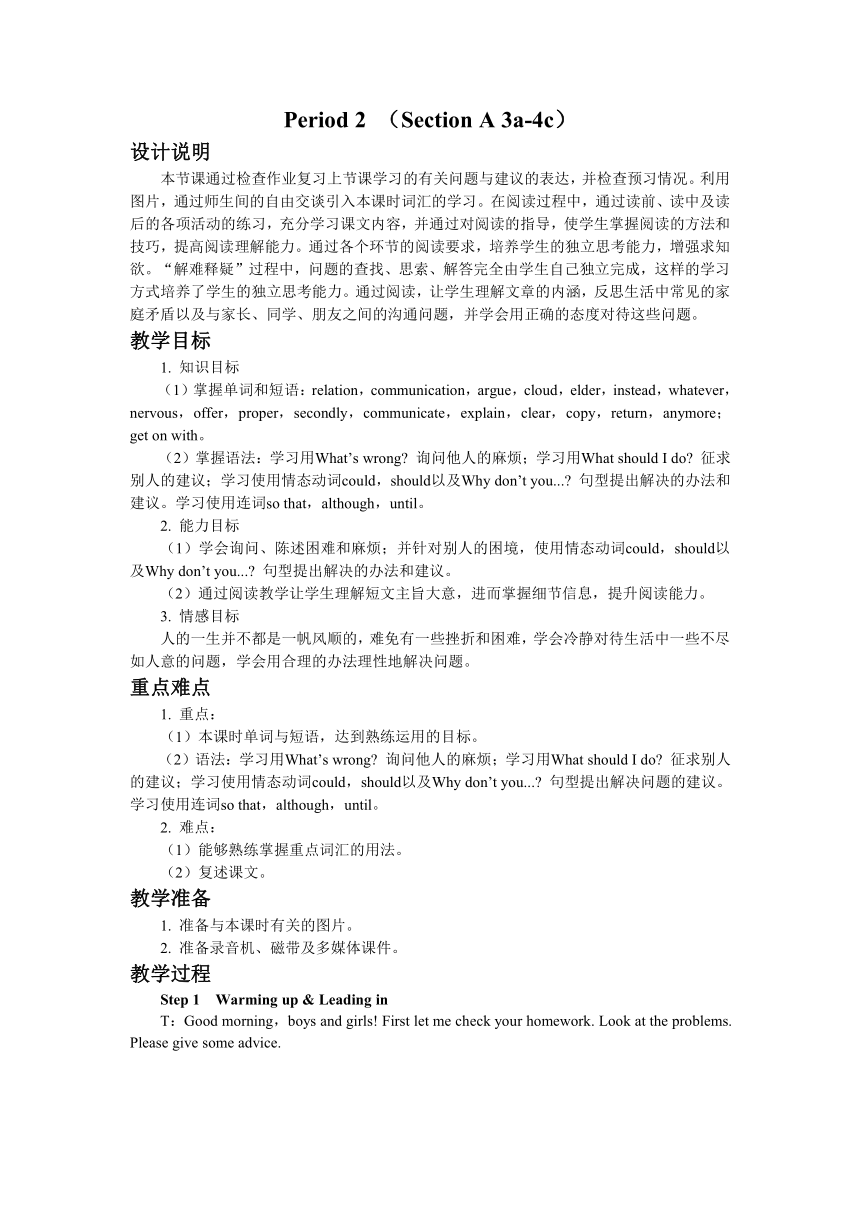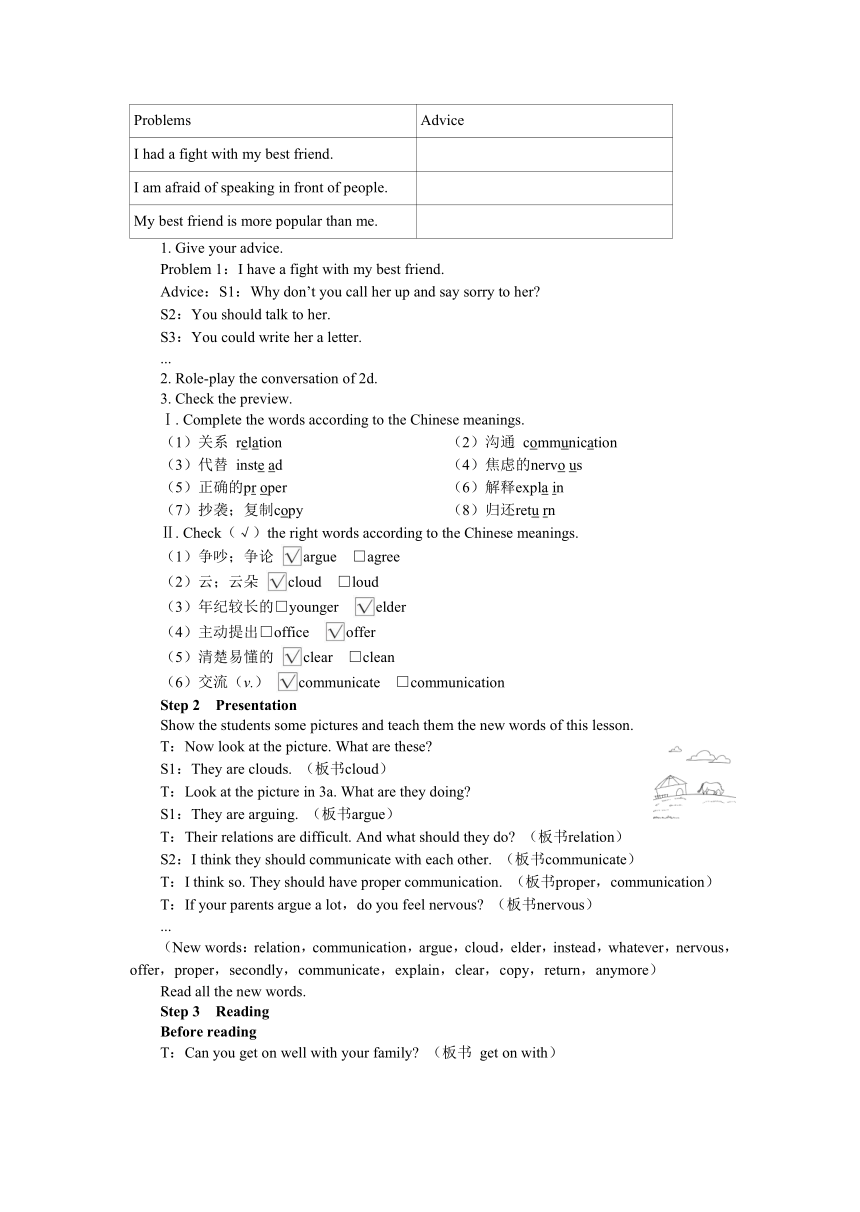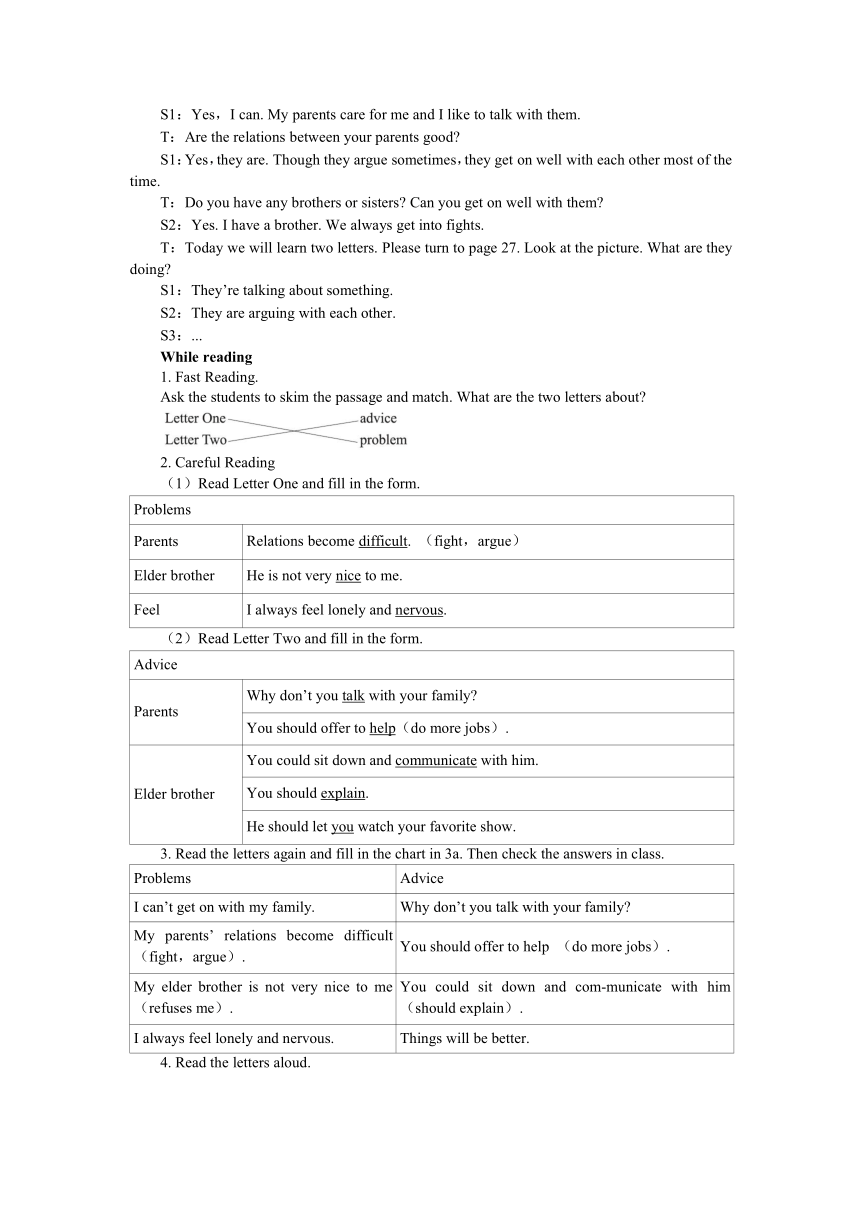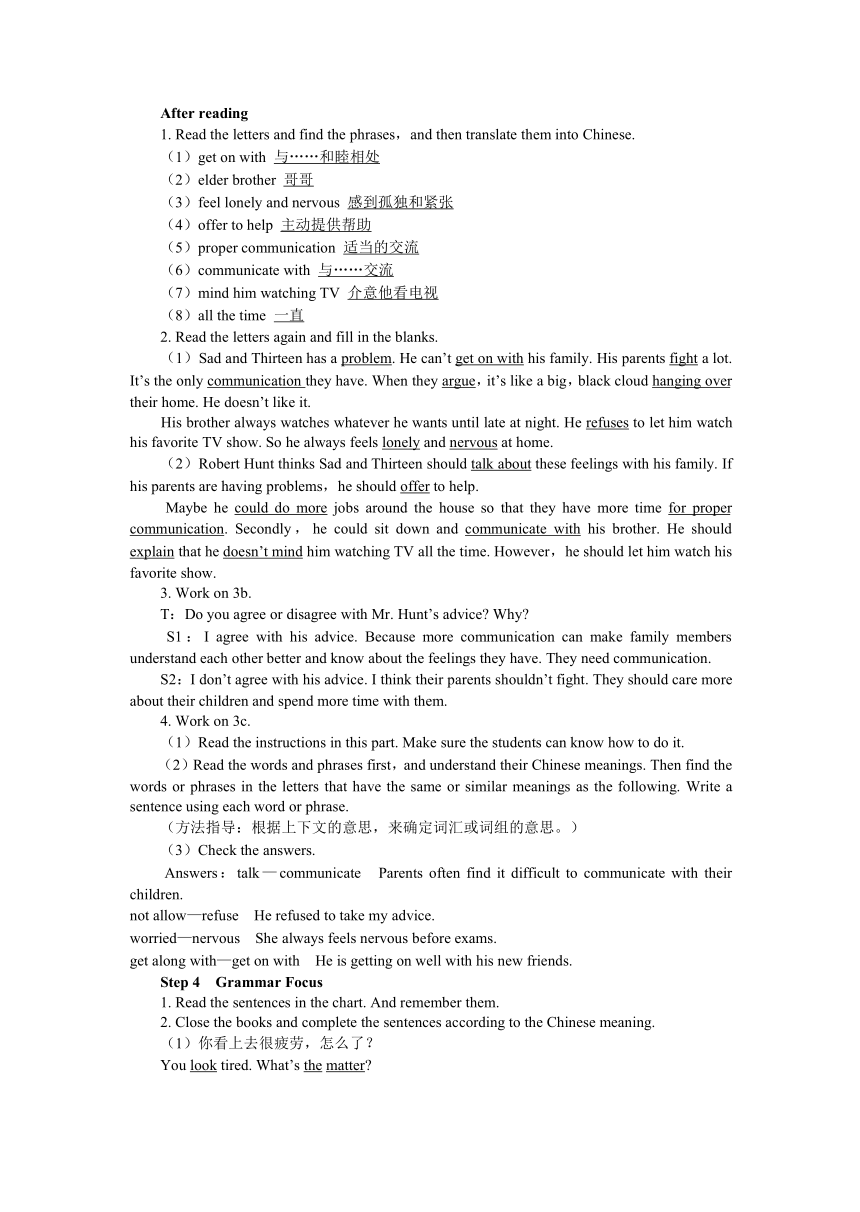UNIT 4 Period 2 (Section A 3a-4c)教学详案
文档属性
| 名称 | UNIT 4 Period 2 (Section A 3a-4c)教学详案 |  | |
| 格式 | docx | ||
| 文件大小 | 103.2KB | ||
| 资源类型 | 试卷 | ||
| 版本资源 | 人教新目标(Go for it)版 | ||
| 科目 | 英语 | ||
| 更新时间 | 2024-02-21 19:33:35 | ||
图片预览




文档简介
Period 2 (Section A 3a-4c)
设计说明
本节课通过检查作业复习上节课学习的有关问题与建议的表达,并检查预习情况。利用图片,通过师生间的自由交谈引入本课时词汇的学习。在阅读过程中,通过读前、读中及读后的各项活动的练习,充分学习课文内容,并通过对阅读的指导,使学生掌握阅读的方法和技巧,提高阅读理解能力。通过各个环节的阅读要求,培养学生的独立思考能力,增强求知欲。“解难释疑”过程中,问题的查找、思索、解答完全由学生自己独立完成,这样的学习方式培养了学生的独立思考能力。通过阅读,让学生理解文章的内涵,反思生活中常见的家庭矛盾以及与家长、同学、朋友之间的沟通问题,并学会用正确的态度对待这些问题。
教学目标
1. 知识目标
(1)掌握单词和短语:relation,communication,argue,cloud,elder,instead,whatever,nervous,offer,proper,secondly,communicate,explain,clear,copy,return,anymore;get on with。
(2)掌握语法:学习用What’s wrong 询问他人的麻烦;学习用What should I do 征求别人的建议;学习使用情态动词could,should以及Why don’t you... 句型提出解决的办法和建议。学习使用连词so that,although,until。
2. 能力目标
(1)学会询问、陈述困难和麻烦;并针对别人的困境,使用情态动词could,should以及Why don’t you... 句型提出解决的办法和建议。
(2)通过阅读教学让学生理解短文主旨大意,进而掌握细节信息,提升阅读能力。
3. 情感目标
人的一生并不都是一帆风顺的,难免有一些挫折和困难,学会冷静对待生活中一些不尽如人意的问题,学会用合理的办法理性地解决问题。
重点难点
1. 重点:
(1)本课时单词与短语,达到熟练运用的目标。
(2)语法:学习用What’s wrong 询问他人的麻烦;学习用What should I do 征求别人的建议;学习使用情态动词could,should以及Why don’t you... 句型提出解决问题的建议。学习使用连词so that,although,until。
2. 难点:
(1)能够熟练掌握重点词汇的用法。
(2)复述课文。
教学准备
1. 准备与本课时有关的图片。
2. 准备录音机、磁带及多媒体课件。
教学过程
Step 1 Warming up & Leading in
T:Good morning,boys and girls! First let me check your homework. Look at the problems. Please give some advice.
Problems Advice
I had a fight with my best friend.
I am afraid of speaking in front of people.
My best friend is more popular than me.
1. Give your advice.
Problem 1:I have a fight with my best friend.
Advice:S1:Why don’t you call her up and say sorry to her
S2:You should talk to her.
S3:You could write her a letter.
...
2. Role-play the conversation of 2d.
3. Check the preview.
Ⅰ. Complete the words according to the Chinese meanings.
(1)关系 relation (2)沟通 communication
(3)代替 inste ad (4)焦虑的nervo us
(5)正确的pr oper (6)解释expla in
(7)抄袭;复制copy (8)归还retu rn
Ⅱ. Check(√)the right words according to the Chinese meanings.
(1)争吵;争论 argue □agree
(2)云;云朵 cloud □loud
(3)年纪较长的□younger elder
(4)主动提出□office offer
(5)清楚易懂的 clear □clean
(6)交流(v.) communicate □communication
Step 2 Presentation
Show the students some pictures and teach them the new words of this lesson.
T:Now look at the picture. What are these
S1:They are clouds. (板书cloud)
T:Look at the picture in 3a. What are they doing
S1:They are arguing. (板书argue)
T:Their relations are difficult. And what should they do (板书relation)
S2:I think they should communicate with each other. (板书communicate)
T:I think so. They should have proper communication. (板书proper,communication)
T:If your parents argue a lot,do you feel nervous (板书nervous)
...
(New words:relation,communication,argue,cloud,elder,instead,whatever,nervous,offer,proper,secondly,communicate,explain,clear,copy,return,anymore)
Read all the new words.
Step 3 Reading
Before reading
T:Can you get on well with your family (板书 get on with)
S1:Yes,I can. My parents care for me and I like to talk with them.
T:Are the relations between your parents good
S1:Yes,they are. Though they argue sometimes,they get on well with each other most of the time.
T:Do you have any brothers or sisters Can you get on well with them
S2:Yes. I have a brother. We always get into fights.
T:Today we will learn two letters. Please turn to page 27. Look at the picture. What are they doing
S1:They’re talking about something.
S2:They are arguing with each other.
S3:...
While reading
1. Fast Reading.
Ask the students to skim the passage and match. What are the two letters about
2. Careful Reading
(1)Read Letter One and fill in the form.
Problems
Parents Relations become difficult. (fight,argue)
Elder brother He is not very nice to me.
Feel I always feel lonely and nervous.
(2)Read Letter Two and fill in the form.
Advice
Parents Why don’t you talk with your family
You should offer to help(do more jobs).
Elder brother You could sit down and communicate with him.
You should explain.
He should let you watch your favorite show.
3. Read the letters again and fill in the chart in 3a. Then check the answers in class.
Problems Advice
I can’t get on with my family. Why don’t you talk with your family
My parents’ relations become difficult(fight,argue). You should offer to help (do more jobs).
My elder brother is not very nice to me(refuses me). You could sit down and com-municate with him(should explain).
I always feel lonely and nervous. Things will be better.
4. Read the letters aloud.
After reading
1. Read the letters and find the phrases,and then translate them into Chinese.
(1)get on with 与……和睦相处
(2)elder brother 哥哥
(3)feel lonely and nervous 感到孤独和紧张
(4)offer to help 主动提供帮助
(5)proper communication 适当的交流
(6)communicate with 与……交流
(7)mind him watching TV 介意他看电视
(8)all the time 一直
2. Read the letters again and fill in the blanks.
(1)Sad and Thirteen has a problem. He can’t get on with his family. His parents fight a lot. It’s the only communication they have. When they argue,it’s like a big,black cloud hanging over their home. He doesn’t like it.
His brother always watches whatever he wants until late at night. He refuses to let him watch his favorite TV show. So he always feels lonely and nervous at home.
(2)Robert Hunt thinks Sad and Thirteen should talk about these feelings with his family. If his parents are having problems,he should offer to help.
Maybe he could do more jobs around the house so that they have more time for proper communication. Secondly,he could sit down and communicate with his brother. He should explain that he doesn’t mind him watching TV all the time. However,he should let him watch his favorite show.
3. Work on 3b.
T:Do you agree or disagree with Mr. Hunt’s advice Why
S1:I agree with his advice. Because more communication can make family members understand each other better and know about the feelings they have. They need communication.
S2:I don’t agree with his advice. I think their parents shouldn’t fight. They should care more about their children and spend more time with them.
4. Work on 3c.
(1)Read the instructions in this part. Make sure the students can know how to do it.
(2)Read the words and phrases first,and understand their Chinese meanings. Then find the words or phrases in the letters that have the same or similar meanings as the following. Write a sentence using each word or phrase.
(方法指导:根据上下文的意思,来确定词汇或词组的意思。)
(3)Check the answers.
Answers:talk—communicate Parents often find it difficult to communicate with their children.
not allow—refuse He refused to take my advice.
worried—nervous She always feels nervous before exams.
get along with—get on with He is getting on well with his new friends.
Step 4 Grammar Focus
1. Read the sentences in the chart. And remember them.
2. Close the books and complete the sentences according to the Chinese meaning.
(1)你看上去很疲劳,怎么了?
You look tired. What’s the matter
(2)昨晚,我做作业到很晚,因此我没有睡足觉。
I did my homework until really late last night, so I didn’t get enough sleep.
(3)我应该做什么?
What should I do
(4)你为什么不忘掉此事呢?尽管她错了,但没什么大不了的。
Why don’t you forget about it Although she’s wrong,it’s not a big deal.
(5)他应当做什么?
What should he do
(6)他应当和他的朋友交谈一下,以便他能道歉。
He should talk to his friend so that he can say he’s sorry.
(7)或许你可以去他家。
Maybe you could go to his house.
(8)我想我可以,但是我不想让他吃惊。
I guess I could,but I don’t want to surprise him.
3. Open the books and check the answers.
4. Have some students sum up the grammar.
5.(1)提建议的句型:
You should/could...
Why not/Why don’t you...
(2)引导状语从句的连词
although即使,尽管 until直到……为止
so that结果,因此
Step 5 Practice
Work on 4a.
1. Fill in the blanks with although,so that or until.
2. Check the answers.
Answers:1. so that 2. Although 3. until 4. Although
3. Practice in pairs.
Work on 4b.
1. Read the problems.(Make sure the students can understand them. )
2. Write one piece of advice for each problem. Then compare your advice with your partner’s and decide whether the advice is good or bad.
3. Read your advice.
Work on 4c.
1. Read the problems in the box.(Make sure the students can understand them. )
2. Work in groups of four. Choose one of the problems and ask your classmates for advice. Decide which classmate has the best advice.
Step 6 Survey
T:What problems do you have Please discuss them in groups and fill in the blanks.
Name What problems do you have Advice
At school At home
John not good at English have no time to watch TV should practice reading English and work harder at school,try to do things quickly
Lily not have enough sleep argue with her brother go to bed early,communi-cate with your brother
... ... ... ...
... ... ... ...
Step 7 Cooperative inquiry
Discuss the following language points in groups and fill in the blanks.
1. get on with 意为“与……和睦相处/关系良好”,相当于get along with。
The child doesn’t get on well with others.
那个小孩与他人相处得不好。
2. argue意为“争吵;争论”,常用短语:argue with sb.与某人争吵;argue about sth.争论某事。
玛丽经常和她的朋友争论数学题。
Mary often argues with her friends about math problems.
3. instead 副词,意为“代替;反而;却”,常置于句子开头或末尾。instead of是介词短语,后接名词、代词、动词-ing形式等。
4. elder是形容词old的比较级,意为“年级较长的”,在句中只作定语;older也是old的比较级,可放在than前表示比较。
我的哥哥比我大一岁。My elder brother is one year older than I.
5. offer动词,意为“主动提出;自愿给予”。常用结构:offer to do sth.主动提出做某事;offer sb. sth. = offer sth. to sb.给某人提供某物。
He offered to go (go) instead of me.
She offered me a cup of tea. = She offered a cup of tea to me.
6. communicate 动词,意为“交流;沟通”,其名词形式为communication;常用短语:communicate with sb.与某人交流。
李梅能用英语与外国人轻松交流。
Li Mei can easily communicate with foreigners in English.
7. mind sb. + doing sth.意为“介意某人做某事”,其中sb. 可用人称代词宾格形式,也可用形容词性物主代词。
Would you mind me/my smoking (smoke) here
8. explain 动词,意为“解释;说明”,常用短语和句型:explain sth. (to sb. )(向某人)解释某事;explain + that/what/why 等从句。
Please explain it to me. 请你向我解释一下吧。
Can you explain what this means
你能解释一下这个的意思吗?
9. return动词,意为“归还”,相当于give...back,return it to sb. = give it back to sb. ,意为“把它还给某人”。return意为“返回”时,相当于get/come back。
10. leave意为“遗留;落下”,在汉语中常译为“忘记”,其结构为leave sth. +表地点的介词短语。
He left his keys in the room.他把钥匙忘在房间里了。
【拓展】forget意为“忘记”。forget to do sth. 忘记去做某事;forget doing sth. 忘记做过某事。
Don’t forget to close(close) the door when you leave the room.
Step 8 Summary
In this lesson we have learned:
1. New words:relation,communication,argue,cloud,elder,instead,whatever,nervous,offer,proper,secondly,communicate,explain,clear,copy,return,anymore.
2. Phrase:get on with.
3. 提建议句型:You should/could...
Why not/Why don’t you...
4. 引导状语从句的连词:although即使,尽管
until直到……为止 so that结果,因此
当堂达标(见导学案“当堂达标”)
答案与解析:
Ⅰ. 1. argued 句意:昨天我和我最好的朋友争吵了,所以今天我不开心。argue with sb. 意为“和某人争吵”,句子的时间状语为yesterday,所以argue用过去式argued。
2. nervous 句意:当我第一次在公众面前演讲时我感到很紧张。
3. instead 句意:他累了,所以让我去吧。instead意为“代替”。
4. although 句意:“那个男孩会讲英语和日语,虽然他只有十岁。”“多聪明的男孩啊!”although连词,意为“虽然”,引导让步状语从句。
5. explain 句意:你能把那个再解释一遍吗?我不明白。explain意为“解释;说明”。
Ⅱ. 1. clear 2. communication 3. instead 4. argue
5. offered 6. nervous
Ⅲ. 1. to share refuse to do sth. 意为“拒绝做某事”。
2. communication communicate的名词形式为com-munication。句意:与外界所有的联系都断了。
3. elder 句意:吉姆是一名医生。他的哥哥是一名工程师。
4. going instead of doing sth. 意为“代替做某事”。
5. to help offer to do sth. 意为“主动提出做某事”。
6. opening mind sb.’s/sb. doing sth. 意为“介意某人做某事”。
7. clearly hear是动词,要用副词修饰,clear的副词形式为clearly。
8. copying 此处应用动名词短语作主语,copy的动名词形式为copying。
9. saying without是介词,后接动词时用v. -ing形式。
Ⅳ. 1. C information“信息”;competition“竞争”;com-munication“交流”;pollution“污染”。根据常识可 知,微信是最方便的交流方式之一。故选C。
2. B stop意为“停止”;return意为“回来”;prepare意为“准备”;drop意为“落下”。结合选项可推知,句意为“比尔去了图书馆,但是五分钟之后他又回来了”。return符合句意,故选B。
3. A Why not do sth. = Why don’t you do sth. ,意为“(你/你们)为什么不做某事?”;What about后跟doing sth.;Shall we后跟动词原形。relax是动词原形,排除B、C两项,D项不符合语境,故用“Why not do sth. ”句型。
4. B 句意为“直到解出这道题,她才离开学校”。not...until...是固定搭配,意为“直到……才……”,故选B。
5. D offer to do sth. 意为“主动提出做某事”,故选D。
Ⅴ. 1. don’t 2. not talk 3. write to 4. so that
5. What’s wrong/What’s the matter
Ⅵ. 1. A ask sb. for...意为“向某人要求/请求得到……”。
2. B 由上一段多次出现的problems可知,选B。
3. C 根据上下文内容可知,这里指“建议”,a piece of advice意为“一条建议”。
4. B tell sb. to do sth. 意为“告诉某人做某事”;turn down意为“关小(音量)”。
5. A out-of-style“过时的”;new“新的”;in style“流行的”;good“好的”。由下文关键词problems可知,out-of-style符合语境。
6. D heavy“重的”;small“小的”;new“新的”;serious“严重的”。句意:像穿着不时尚、没时间参加朋友的聚会这样的问题,都算不上是严重的问题,但是你应该巧妙地处理它们。
7. A that引导的从句作动词say的宾语。
8. D 此处的ones指代problems。
9. B be friendly“友好的”,前面谈到了吵架,因此这里建议要和对方友好地交谈一下。
10. C 由后面的you should go to work or get a part-time job可知,答案为C。
Step 9 Homework
1. Read and copy the new words of this lesson.
2. Retell the letters in 3a.
3. Recite the sentences in Grammar Focus.
板书设计
UNIT 4 Why don’t you talk to your parents Period 2 (Section A 3a-4c)
relation communication argue cloud elder instead whatever nervous offer proper secondly communicate explain clear copy return anymore get on with 1. 询问他人的麻烦:What’s wrong 2. 征求别人的建议:What should I do 3. 提出解决的办法和建议: could + do... should + do... Why don’t you... 4. 连词:until,so that,although
教学反思
设计说明
本节课通过检查作业复习上节课学习的有关问题与建议的表达,并检查预习情况。利用图片,通过师生间的自由交谈引入本课时词汇的学习。在阅读过程中,通过读前、读中及读后的各项活动的练习,充分学习课文内容,并通过对阅读的指导,使学生掌握阅读的方法和技巧,提高阅读理解能力。通过各个环节的阅读要求,培养学生的独立思考能力,增强求知欲。“解难释疑”过程中,问题的查找、思索、解答完全由学生自己独立完成,这样的学习方式培养了学生的独立思考能力。通过阅读,让学生理解文章的内涵,反思生活中常见的家庭矛盾以及与家长、同学、朋友之间的沟通问题,并学会用正确的态度对待这些问题。
教学目标
1. 知识目标
(1)掌握单词和短语:relation,communication,argue,cloud,elder,instead,whatever,nervous,offer,proper,secondly,communicate,explain,clear,copy,return,anymore;get on with。
(2)掌握语法:学习用What’s wrong 询问他人的麻烦;学习用What should I do 征求别人的建议;学习使用情态动词could,should以及Why don’t you... 句型提出解决的办法和建议。学习使用连词so that,although,until。
2. 能力目标
(1)学会询问、陈述困难和麻烦;并针对别人的困境,使用情态动词could,should以及Why don’t you... 句型提出解决的办法和建议。
(2)通过阅读教学让学生理解短文主旨大意,进而掌握细节信息,提升阅读能力。
3. 情感目标
人的一生并不都是一帆风顺的,难免有一些挫折和困难,学会冷静对待生活中一些不尽如人意的问题,学会用合理的办法理性地解决问题。
重点难点
1. 重点:
(1)本课时单词与短语,达到熟练运用的目标。
(2)语法:学习用What’s wrong 询问他人的麻烦;学习用What should I do 征求别人的建议;学习使用情态动词could,should以及Why don’t you... 句型提出解决问题的建议。学习使用连词so that,although,until。
2. 难点:
(1)能够熟练掌握重点词汇的用法。
(2)复述课文。
教学准备
1. 准备与本课时有关的图片。
2. 准备录音机、磁带及多媒体课件。
教学过程
Step 1 Warming up & Leading in
T:Good morning,boys and girls! First let me check your homework. Look at the problems. Please give some advice.
Problems Advice
I had a fight with my best friend.
I am afraid of speaking in front of people.
My best friend is more popular than me.
1. Give your advice.
Problem 1:I have a fight with my best friend.
Advice:S1:Why don’t you call her up and say sorry to her
S2:You should talk to her.
S3:You could write her a letter.
...
2. Role-play the conversation of 2d.
3. Check the preview.
Ⅰ. Complete the words according to the Chinese meanings.
(1)关系 relation (2)沟通 communication
(3)代替 inste ad (4)焦虑的nervo us
(5)正确的pr oper (6)解释expla in
(7)抄袭;复制copy (8)归还retu rn
Ⅱ. Check(√)the right words according to the Chinese meanings.
(1)争吵;争论 argue □agree
(2)云;云朵 cloud □loud
(3)年纪较长的□younger elder
(4)主动提出□office offer
(5)清楚易懂的 clear □clean
(6)交流(v.) communicate □communication
Step 2 Presentation
Show the students some pictures and teach them the new words of this lesson.
T:Now look at the picture. What are these
S1:They are clouds. (板书cloud)
T:Look at the picture in 3a. What are they doing
S1:They are arguing. (板书argue)
T:Their relations are difficult. And what should they do (板书relation)
S2:I think they should communicate with each other. (板书communicate)
T:I think so. They should have proper communication. (板书proper,communication)
T:If your parents argue a lot,do you feel nervous (板书nervous)
...
(New words:relation,communication,argue,cloud,elder,instead,whatever,nervous,offer,proper,secondly,communicate,explain,clear,copy,return,anymore)
Read all the new words.
Step 3 Reading
Before reading
T:Can you get on well with your family (板书 get on with)
S1:Yes,I can. My parents care for me and I like to talk with them.
T:Are the relations between your parents good
S1:Yes,they are. Though they argue sometimes,they get on well with each other most of the time.
T:Do you have any brothers or sisters Can you get on well with them
S2:Yes. I have a brother. We always get into fights.
T:Today we will learn two letters. Please turn to page 27. Look at the picture. What are they doing
S1:They’re talking about something.
S2:They are arguing with each other.
S3:...
While reading
1. Fast Reading.
Ask the students to skim the passage and match. What are the two letters about
2. Careful Reading
(1)Read Letter One and fill in the form.
Problems
Parents Relations become difficult. (fight,argue)
Elder brother He is not very nice to me.
Feel I always feel lonely and nervous.
(2)Read Letter Two and fill in the form.
Advice
Parents Why don’t you talk with your family
You should offer to help(do more jobs).
Elder brother You could sit down and communicate with him.
You should explain.
He should let you watch your favorite show.
3. Read the letters again and fill in the chart in 3a. Then check the answers in class.
Problems Advice
I can’t get on with my family. Why don’t you talk with your family
My parents’ relations become difficult(fight,argue). You should offer to help (do more jobs).
My elder brother is not very nice to me(refuses me). You could sit down and com-municate with him(should explain).
I always feel lonely and nervous. Things will be better.
4. Read the letters aloud.
After reading
1. Read the letters and find the phrases,and then translate them into Chinese.
(1)get on with 与……和睦相处
(2)elder brother 哥哥
(3)feel lonely and nervous 感到孤独和紧张
(4)offer to help 主动提供帮助
(5)proper communication 适当的交流
(6)communicate with 与……交流
(7)mind him watching TV 介意他看电视
(8)all the time 一直
2. Read the letters again and fill in the blanks.
(1)Sad and Thirteen has a problem. He can’t get on with his family. His parents fight a lot. It’s the only communication they have. When they argue,it’s like a big,black cloud hanging over their home. He doesn’t like it.
His brother always watches whatever he wants until late at night. He refuses to let him watch his favorite TV show. So he always feels lonely and nervous at home.
(2)Robert Hunt thinks Sad and Thirteen should talk about these feelings with his family. If his parents are having problems,he should offer to help.
Maybe he could do more jobs around the house so that they have more time for proper communication. Secondly,he could sit down and communicate with his brother. He should explain that he doesn’t mind him watching TV all the time. However,he should let him watch his favorite show.
3. Work on 3b.
T:Do you agree or disagree with Mr. Hunt’s advice Why
S1:I agree with his advice. Because more communication can make family members understand each other better and know about the feelings they have. They need communication.
S2:I don’t agree with his advice. I think their parents shouldn’t fight. They should care more about their children and spend more time with them.
4. Work on 3c.
(1)Read the instructions in this part. Make sure the students can know how to do it.
(2)Read the words and phrases first,and understand their Chinese meanings. Then find the words or phrases in the letters that have the same or similar meanings as the following. Write a sentence using each word or phrase.
(方法指导:根据上下文的意思,来确定词汇或词组的意思。)
(3)Check the answers.
Answers:talk—communicate Parents often find it difficult to communicate with their children.
not allow—refuse He refused to take my advice.
worried—nervous She always feels nervous before exams.
get along with—get on with He is getting on well with his new friends.
Step 4 Grammar Focus
1. Read the sentences in the chart. And remember them.
2. Close the books and complete the sentences according to the Chinese meaning.
(1)你看上去很疲劳,怎么了?
You look tired. What’s the matter
(2)昨晚,我做作业到很晚,因此我没有睡足觉。
I did my homework until really late last night, so I didn’t get enough sleep.
(3)我应该做什么?
What should I do
(4)你为什么不忘掉此事呢?尽管她错了,但没什么大不了的。
Why don’t you forget about it Although she’s wrong,it’s not a big deal.
(5)他应当做什么?
What should he do
(6)他应当和他的朋友交谈一下,以便他能道歉。
He should talk to his friend so that he can say he’s sorry.
(7)或许你可以去他家。
Maybe you could go to his house.
(8)我想我可以,但是我不想让他吃惊。
I guess I could,but I don’t want to surprise him.
3. Open the books and check the answers.
4. Have some students sum up the grammar.
5.(1)提建议的句型:
You should/could...
Why not/Why don’t you...
(2)引导状语从句的连词
although即使,尽管 until直到……为止
so that结果,因此
Step 5 Practice
Work on 4a.
1. Fill in the blanks with although,so that or until.
2. Check the answers.
Answers:1. so that 2. Although 3. until 4. Although
3. Practice in pairs.
Work on 4b.
1. Read the problems.(Make sure the students can understand them. )
2. Write one piece of advice for each problem. Then compare your advice with your partner’s and decide whether the advice is good or bad.
3. Read your advice.
Work on 4c.
1. Read the problems in the box.(Make sure the students can understand them. )
2. Work in groups of four. Choose one of the problems and ask your classmates for advice. Decide which classmate has the best advice.
Step 6 Survey
T:What problems do you have Please discuss them in groups and fill in the blanks.
Name What problems do you have Advice
At school At home
John not good at English have no time to watch TV should practice reading English and work harder at school,try to do things quickly
Lily not have enough sleep argue with her brother go to bed early,communi-cate with your brother
... ... ... ...
... ... ... ...
Step 7 Cooperative inquiry
Discuss the following language points in groups and fill in the blanks.
1. get on with 意为“与……和睦相处/关系良好”,相当于get along with。
The child doesn’t get on well with others.
那个小孩与他人相处得不好。
2. argue意为“争吵;争论”,常用短语:argue with sb.与某人争吵;argue about sth.争论某事。
玛丽经常和她的朋友争论数学题。
Mary often argues with her friends about math problems.
3. instead 副词,意为“代替;反而;却”,常置于句子开头或末尾。instead of是介词短语,后接名词、代词、动词-ing形式等。
4. elder是形容词old的比较级,意为“年级较长的”,在句中只作定语;older也是old的比较级,可放在than前表示比较。
我的哥哥比我大一岁。My elder brother is one year older than I.
5. offer动词,意为“主动提出;自愿给予”。常用结构:offer to do sth.主动提出做某事;offer sb. sth. = offer sth. to sb.给某人提供某物。
He offered to go (go) instead of me.
She offered me a cup of tea. = She offered a cup of tea to me.
6. communicate 动词,意为“交流;沟通”,其名词形式为communication;常用短语:communicate with sb.与某人交流。
李梅能用英语与外国人轻松交流。
Li Mei can easily communicate with foreigners in English.
7. mind sb. + doing sth.意为“介意某人做某事”,其中sb. 可用人称代词宾格形式,也可用形容词性物主代词。
Would you mind me/my smoking (smoke) here
8. explain 动词,意为“解释;说明”,常用短语和句型:explain sth. (to sb. )(向某人)解释某事;explain + that/what/why 等从句。
Please explain it to me. 请你向我解释一下吧。
Can you explain what this means
你能解释一下这个的意思吗?
9. return动词,意为“归还”,相当于give...back,return it to sb. = give it back to sb. ,意为“把它还给某人”。return意为“返回”时,相当于get/come back。
10. leave意为“遗留;落下”,在汉语中常译为“忘记”,其结构为leave sth. +表地点的介词短语。
He left his keys in the room.他把钥匙忘在房间里了。
【拓展】forget意为“忘记”。forget to do sth. 忘记去做某事;forget doing sth. 忘记做过某事。
Don’t forget to close(close) the door when you leave the room.
Step 8 Summary
In this lesson we have learned:
1. New words:relation,communication,argue,cloud,elder,instead,whatever,nervous,offer,proper,secondly,communicate,explain,clear,copy,return,anymore.
2. Phrase:get on with.
3. 提建议句型:You should/could...
Why not/Why don’t you...
4. 引导状语从句的连词:although即使,尽管
until直到……为止 so that结果,因此
当堂达标(见导学案“当堂达标”)
答案与解析:
Ⅰ. 1. argued 句意:昨天我和我最好的朋友争吵了,所以今天我不开心。argue with sb. 意为“和某人争吵”,句子的时间状语为yesterday,所以argue用过去式argued。
2. nervous 句意:当我第一次在公众面前演讲时我感到很紧张。
3. instead 句意:他累了,所以让我去吧。instead意为“代替”。
4. although 句意:“那个男孩会讲英语和日语,虽然他只有十岁。”“多聪明的男孩啊!”although连词,意为“虽然”,引导让步状语从句。
5. explain 句意:你能把那个再解释一遍吗?我不明白。explain意为“解释;说明”。
Ⅱ. 1. clear 2. communication 3. instead 4. argue
5. offered 6. nervous
Ⅲ. 1. to share refuse to do sth. 意为“拒绝做某事”。
2. communication communicate的名词形式为com-munication。句意:与外界所有的联系都断了。
3. elder 句意:吉姆是一名医生。他的哥哥是一名工程师。
4. going instead of doing sth. 意为“代替做某事”。
5. to help offer to do sth. 意为“主动提出做某事”。
6. opening mind sb.’s/sb. doing sth. 意为“介意某人做某事”。
7. clearly hear是动词,要用副词修饰,clear的副词形式为clearly。
8. copying 此处应用动名词短语作主语,copy的动名词形式为copying。
9. saying without是介词,后接动词时用v. -ing形式。
Ⅳ. 1. C information“信息”;competition“竞争”;com-munication“交流”;pollution“污染”。根据常识可 知,微信是最方便的交流方式之一。故选C。
2. B stop意为“停止”;return意为“回来”;prepare意为“准备”;drop意为“落下”。结合选项可推知,句意为“比尔去了图书馆,但是五分钟之后他又回来了”。return符合句意,故选B。
3. A Why not do sth. = Why don’t you do sth. ,意为“(你/你们)为什么不做某事?”;What about后跟doing sth.;Shall we后跟动词原形。relax是动词原形,排除B、C两项,D项不符合语境,故用“Why not do sth. ”句型。
4. B 句意为“直到解出这道题,她才离开学校”。not...until...是固定搭配,意为“直到……才……”,故选B。
5. D offer to do sth. 意为“主动提出做某事”,故选D。
Ⅴ. 1. don’t 2. not talk 3. write to 4. so that
5. What’s wrong/What’s the matter
Ⅵ. 1. A ask sb. for...意为“向某人要求/请求得到……”。
2. B 由上一段多次出现的problems可知,选B。
3. C 根据上下文内容可知,这里指“建议”,a piece of advice意为“一条建议”。
4. B tell sb. to do sth. 意为“告诉某人做某事”;turn down意为“关小(音量)”。
5. A out-of-style“过时的”;new“新的”;in style“流行的”;good“好的”。由下文关键词problems可知,out-of-style符合语境。
6. D heavy“重的”;small“小的”;new“新的”;serious“严重的”。句意:像穿着不时尚、没时间参加朋友的聚会这样的问题,都算不上是严重的问题,但是你应该巧妙地处理它们。
7. A that引导的从句作动词say的宾语。
8. D 此处的ones指代problems。
9. B be friendly“友好的”,前面谈到了吵架,因此这里建议要和对方友好地交谈一下。
10. C 由后面的you should go to work or get a part-time job可知,答案为C。
Step 9 Homework
1. Read and copy the new words of this lesson.
2. Retell the letters in 3a.
3. Recite the sentences in Grammar Focus.
板书设计
UNIT 4 Why don’t you talk to your parents Period 2 (Section A 3a-4c)
relation communication argue cloud elder instead whatever nervous offer proper secondly communicate explain clear copy return anymore get on with 1. 询问他人的麻烦:What’s wrong 2. 征求别人的建议:What should I do 3. 提出解决的办法和建议: could + do... should + do... Why don’t you... 4. 连词:until,so that,although
教学反思
同课章节目录
- Unit 1 What's the matter?
- Section A
- Section B
- Unit 2 I'll help to clean up the city parks.
- Section A
- Section B
- Unit 3 Could you please clean your room?
- Section A
- Section B
- Unit 4 Why don't you talk to your parents?
- Section A
- Section B
- Unit 5 What were you doing when the rainstorm came
- Section A
- Section B
- Review of Units 1-5
- Unit 6 An old man tried to move the mountains.
- Section A
- Section B
- Unit 7 What's the highest mountain in the world?
- Section A
- Section B
- Unit 8 Have you read Treasure Island yet?
- Section A
- Section B
- Unit 9 Have you ever been to a museum?
- Section A
- Section B
- Unit 10 I've had this bike for three years.
- Section A
- Section B
